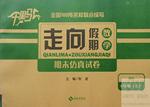题目内容
A dense wave of smog began in the Chinese city of Harbin and the surrounding Heilongjiang, Jilin, and Liaoning Provinces on 20 October 2013. Unseasonably warm temperatures with very little wind across northeastern China coincided with the smoke from local farmers’ burning straws and the start-up of Harbin’s coal-powered central heating system.
Record densities of fine particulates(微粒)were measured in the city. In Harbin, the levels of PM2.5 (particulate matter) rise to 1,000 micrograms per cubic meter, worse than Beijing’s historic highs.Visibility was reduced to below 50m in parts of Harbin, and below 500m in most of the neighbouring Jilin Province. On Fa Yuen Street in Harbin, visibility of less than 5m was reported. The smog reduced after October 23, 2013 and completely broke up on October 28, 2013 by the first local snow and icy rain due to a cold front moving in from Russia.
Harbin lies in the north of China where winter temperatures can drop to -40℃, demanding a six-month heating season. Daily particulate levels of more than 40 times the World Health Organization recommended maximum level were reported in parts of Harbin. The smog remained till 23 October, when almost all monitoring stations in Heilongjiang, Jilin, and Liaoning Provinces reported readings above 200μg/mfor PM2.5. PM 2.5 is the amount of particulate matter less than 2.5 micrometers in diameter in the air, with the WHO recommending a maximum 24-hour mean (平均值) of 25 micrograms per cubic meter (μg/m).On the morning of 25 October, PM2.5 measurements in Harbin had fallen to an average of 123μg/m.
All highways in the surrounding Heilongjiang Province were closed. In Harbin, all primary and middle schools were closed for three days and authorities stopped flights at the airports. Hospitals reported a 23 percent increase in admissions for breathing problems. However, this smog will have no influence on Harbin Ice Festival events later in December 2013.
Air pollution in Chinese cities is of increasing concern to China’s leadership. Particulates in the air can affect human health and also have influences on climate and rainfall. Pollution from the burning of coal has reduced life expectancy by 5.5 years in the north of China, as a result of heart and lung diseases.
1.One cause of the heavy smog in the northeastern Chinese cities may be _____.
A.the lasting cold weather
B.farmers’ burning of forests
C.too much strong wind
D.the start-up of heating system
2.One serious influence of the heavy smog was that_____.
A.Harbin Ice Festival would be cancelled
B.highways in Heilongjiang were free of charge
C.all flights at the airport were cancelled
D.doctors in hospitals were kept from working
3.The harmful smog was most serious on ______.
A.October 20 B.October 23
C.October 25 D.October 28
4.What measure might be practical to reduce the happening of heavy smog?
A.Forbidding people to own their private cars.
B.Advocating people having one meal a day.
C.Using natural gas to cook instead of coal.
D.Encouraging family’s coal-fired heating.
1.D
2.C
3.B
4.C
【解析】
试题分析:2013年10月20日,中国北方出现大范围雾霾天气。东三省PM2.5再次“爆表”。雾霾天气对居民的身体健康有极大的不良影响,医院接受的呼吸道疾病患者增加。我们的世界正在逐渐变得难以看清,能见度500米,50米,甚至5米。
1.D细节信息题。根据文章第一段最后一句“Unseasonably warm temperatures with very little wind across northeastern China coincided with the smoke from local farmers’ burning straws and the start-up of Harbin’s coal-powered central heating system.”可知,不合时令的高气温、无风、当地农民燃烧秸秆和哈尔滨煤矿供电的中心供暖系统的开启,导致了大范围的雾霾天气,即冬季燃烧供暖是导致北方的雾霾的原因之一。故该题正确答案为D.
2.C细节信息题。根据文章倒数第二段所讲到的该次雾霾所产生的影响可知,该题正确答案为C.
3.B细节信息题。根据文章第三段中“The smog remained till 23 October, when almost all monitoring stations in Heilongjiang, Jilin, and Liaoning Provinces reported readings above 200μg/mfor PM2.5.””可知雾霾浓度在23号达到了PM2.5的峰值。故选B.
4.C推理判读题。根据文章可知,烧煤与雾霾的产生有直接的关系,所以减少煤的燃烧可以有效地降低雾霾的发生。故该题正确答案为C.
考点:社会生活类文章的阅读

 千里马走向假期期末仿真试卷寒假系列答案
千里马走向假期期末仿真试卷寒假系列答案